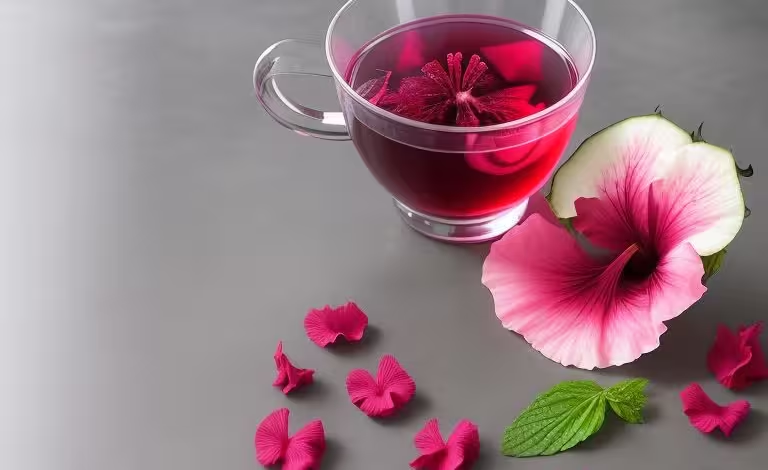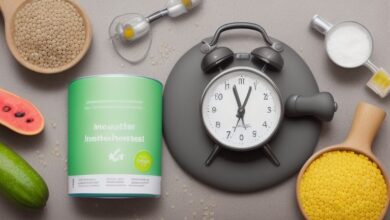7 Reasons You Should or Should Not Drink Hibiscus Tea on an Empty Stomach

7 Reasons You Should or Should Not Drink Hibiscus Tea on an Empty Stomach
If you have ever found yourself wondering, “Can I drink hibiscus tea on an empty stomach?”, you're not alone. This fuchsia-colored, sour tea has gained a huge following among health enthusiasts. So, grabbing that glass might pose a dilemma in your mind right after waking up: is it the best choice or not? Want to know how to make your mornings better, or at least, understand the benefits and consequences that come with drinking hibiscus tea on an empty stomach? This article will help you understand the probable advantages and disadvantages associated with its intake.
What is Hibiscus Tea?
Hibiscus tea is an herbal infusion made from the petals of the dried flower of the hibiscus plant. This tantalizing beverage, colored a striking red, refreshes with a tangy taste. Rich in antioxidants, vitamins, and minerals, the tea has long been favored by those pursuing a healthy lifestyle.
Is It Safe to Drink Hibiscus Tea on an Empty Stomach?
The Good Side: Possible Benefits
- Boosts Metabolism
A cup of hibiscus tea in the morning can help increase your metabolism. In a study, hibiscus tea, rich in antioxidants and especially anthocyanins, was associated with increased metabolism and fat burning. Thus, it may be an excellent beverage for those seeking to lose a few pounds. - Rich in Antioxidants
Drinking hibiscus tea on an empty stomach will help your body absorb its antioxidants better. These antioxidants fight free radicals in the human system, breaking down oxidative stress, and may be related to a reduced risk of developing chronic diseases. - Supports Digestive Health
If you're prone to digestive issues, then hibiscus tea might be your new morning buddy. With mild diuretic and laxative effects, it helps cleanse your system and promotes regular bowel movements. - May Help Lower Blood Pressure
Several studies have indicated that hibiscus tea can help reduce high blood pressure. Drinking it on an empty stomach might optimize this effect, making it a natural option for managing hypertension. - Natural Mood Booster
You can also consume hibiscus tea in the morning to boost your mood. Flavonoids in hibiscus have been linked to improved mental health by reducing symptoms of anxiety and depression. A calming cup of hibiscus tea could be just what you need to start your day on a positive note.
The Not-So-Good Side: Possible Disadvantages
- May Cause Stomach Upset
Drinking hibiscus tea on an empty stomach can cause stomach discomfort—nausea or cramping—in some people. The acidity of the tea might act on the empty stomach and cause issues, especially in those with sensitive digestive systems. - Can Lower Blood Sugar Levels
Hibiscus tea has been shown to lower blood sugar levels. While this can be beneficial for some, it might be risky when consumed on an empty stomach. If you have diabetes or are prone to low blood sugar, make sure you monitor your levels and consult a healthcare professional.
Who Should Not Drink Hibiscus Tea on an Empty Stomach?
Although hibiscus tea is generally safe, some people may want to avoid drinking it on an empty stomach:
- Individuals with a history of low blood sugar, stomach ulcers, or acid reflux should consider drinking hibiscus tea later in the day or with a meal.
- Pregnant women should check with their doctor before adding hibiscus tea to their diet, as it has been shown to stimulate uterine contractions.
How to Safely Drink Hibiscus Tea on an Empty Stomach
If you decide to drink hibiscus tea first thing in the morning, here are a few tips to make the experience as beneficial and comfortable as possible:
- Start Small: Begin with a small cup to gauge how your stomach reacts. If you feel any discomfort, consider drinking the tea after a light breakfast instead.
- Add Honey or Ginger: Adding a natural sweetener like honey or a slice of ginger to the tea can offset its acidic pH, reducing the chance of stomach upset.
- Keep Hydrated: Drink plenty of water after your tea to flush out any unwanted substances and keep your digestive system functioning optimally.
- Monitor Your Body's Response: If you feel dizzy or drowsy, it could be a sign that your blood sugar levels are too low, and you might need to eat something.
Incorporating Hibiscus Tea into Your Daily Routine
Hibiscus tea doesn't have to be just a morning drink. You can incorporate it into various parts of your daily routine to enjoy its benefits throughout the day:
- In the Morning: Boost your metabolism and mood with a small cup of hibiscus tea.
- In the Afternoon: Enjoy it cold as a refreshing iced tea at lunch, which also helps keep your blood pressure in check.
- In the Evening: Unwind with a warm cup in the evening, but be cautious if you are sensitive to its diuretic effects.
Hibiscus Tea Recipes to Try
Here are some simple and delicious recipes if you're ready to include hibiscus tea in your everyday routine:
1. Classic Hibiscus Tea
Ingredients:
- 1 tablespoon dried hibiscus petals
- 1 cup boiling water
- Honey or Stevia to taste
Instructions:
- Dip the hibiscus petals in boiling water and steep for 5-10 minutes.
- Strain and add honey or stevia to taste.
2. Hibiscus Iced Tea
Ingredients:
- 2 tablespoons dried hibiscus petals
- 2 cups boiling water
- 1 tablespoon honey
- Ice cubes
Instructions:
- Dip the hibiscus petals in boiling water and steep for 10 minutes.
- Strain and let it cool.
- Add honey and mix well.
- Pour over ice cubes and enjoy.
3. Hibiscus and Ginger Detox Tea
Ingredients:
- 1 tablespoon dried hibiscus petals
- 1-inch piece of fresh ginger, sliced
- 1 cup boiling water
- Lemon juice to taste
Instructions:
- Let the hibiscus petals and ginger steep in boiling water for 10 minutes.
- Strain and add lemon juice.
- Drink warm or chilled.
Final Thoughts
So, is it safe to drink hibiscus tea on an empty stomach? Yes—but with caution. While the richly colored tea offers numerous health benefits, it's essential to listen to your body and understand how it responds. If you experience discomfort, consider drinking it with a meal or later in the day.
Adding a cup of hibiscus tea to your daily routine can be a delightful experience full of taste and health benefits. Whether you're looking to boost metabolism, detoxify your system, or simply enjoy a refreshing herbal drink, hibiscus tea can be easily incorporated into your diet.

